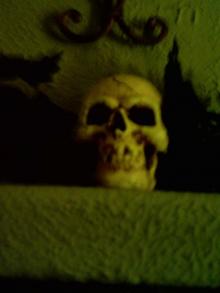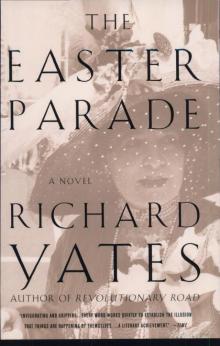- Home
- Richard Yates
A Good School Page 10
A Good School Read online
Page 10
“Anything new?”
“You know; about the school folding up.”
“Oh. No.”
At first, soon after La Prade’s departure, Jack Draper had been torn with wondering what his wife would do. Come back to him? Take the children and leave him? The next move seemed plainly up to her, and she had refused and refused to make her position clear.
“I have to think,” she had explained. “I have to take stock. I have to work a few things out in my mind.”
Well, okay, but what exactly did all that mean? Think about what? Take stock of what? Work what things out in her mind?
And now it was spring. In the evenings, after dinner and before the children’s bedtime, the four of them would sit around the living room in simulation of what real families might be expected to do. He had to admit he was stiff with drink on most of those occasions: he would usually start drinking in the lab in the afternoon and keep it going with heavy shots of bourbon in the kitchen before dinner, and more afterwards.
“Why do your lips look all funny, Daddy?” Millicent asked one night.
“My lips? I don’t know; maybe it’s because I need a kiss.”
Another time he said something dry and witty to his son – he couldn’t even remember what it was – and Alice’s sweet face fell apart in laughter. Her big, lovely eyes danced briefly for him on her side of the room; just before turning away again she said “That’s funny, Jack.”
And that took him back to a time long ago, in college, when a man of much-admired worldliness had said “Know something, Jack? You’ll find there’s no greater pleasure in life than making a girl laugh. Apart from getting laid itself, of course.”
Of course. Getting laid itself. And having now made a girl laugh, was it wholly unreasonable to imagine he might have improved his chances in the area of getting laid itself? Wasn’t getting laid itself a thing almost everyone deserved? Wasn’t it what made the world go around? Even for a funny little polio victim whose arms and legs didn’t really amount to arms and legs at all, and whose wife had been fucked out of her mind by a Frenchman for a year and a half?
But every night, as he struggled out of his Brooks Brothers clothes – oh, yes, and fuck you too, Brooks Brothers, with the terribly tactful bastards in your fitting room (“I expect you’ll want it taken in quite a bit here, sir, am I right? And the trousers taken in quite a bit here? Am I right? And here?”) – every night, as Jack Draper crawled wretchedly naked into his marriage bed, he knew his wife would not join him there. He even knew, with a cripple’s resignation and a drunkard’s terrible calm, that she would probably never join him there again.
Hugh Britt sometimes complained that his leg was “acting up”; he would sit in the Chronicle office kneading the thigh muscles with one strong hand while he winced in pain and blew thin, fatalistic jets of cigarette smoke that billowed back from the open pages of The Brothers Karamazov.
“Is that any good?” Grove asked him once.
And Britt looked up in irritation. “What do you mean, ‘any good’? It’s one of the great works of all time.”
“Yeah, well, what I really mean is, how come you can read it when your leg hurts? I mean, when I’m in pain I just want to lie down and wait for it to be over. See what I mean?”
“Grove, there are times when I simply don’t see what you mean. If I were to lie down now I’d be screaming, or tearing the pillow to shreds with my teeth. I happen to have a good power of concentration and I’m grateful for it in situations like this. Reading takes my mind off the pain.”
“Oh.” And Grove went back to his half-written editorial. It had started off well enough, something about how “our men overseas” might wish for Dorset Academy to become “a better school than the school we know,” but in trying to bring that idea around to a conclusion he had messed up the whole damn thing twice. He knew he could probably write smarter editorials if he read The Brothers Karamazov and some of the other great works of all time, but there was the trouble: if he sat around reading the great works of all time, in or out of pain, how would he ever get his editorials written?
Then Bucky Ward came into the office, dragging a ten- or twelve-foot length of twine with many tin cans attached to it.
“I thought this might be interesting,” he said. “We could tie it to the back of Knoedler’s car and he might not notice it until he’s on the road.”
“You know something, Ward?” Britt said. “That’s the kind of thing people do when they’re nine or ten years old.”
“Yeah, well, I guess I’m slow in the head, then. Always knew there was something funny upstairs. Listen, though, you want to do this, Bill, or not? Because if not I’ll throw it away.”
“Leave it here under the desk for now, okay?” Grove said. “I’ve got to finish this damn thing.”
“Take your time,” Ward said, and he assumed a self-conscious saunter, holding his shoulders high, as he left the room. “No hurry at all.”
All winter, and well into the spring, Grove had been in the quandary of having two friends who didn’t much like each other. Sometimes it seemed that he couldn’t really consider Britt a friend – how could anything as warm and sloppy as friendship apply to an ice-cold perfectionist like Britt? – but he had to acknowledge that Britt was still the one person in the world whose approval he wanted most. And there were signs that he might soon win it, if he watched his step and didn’t fall into dumb stuff like asking if The Brothers Karamazov was any good. Several times Britt had expressed distaste for his present roommate, the plump Kimball, whose bed quaked in its frame every night with the vigor of his masturbation (“I don’t think he cares whether I hear it or not, for God’s sake”) and more than once he had left an implication, too vague to be pressed, that he might be open to the idea of rooming with Grove next year.
As for Bucky Ward, it couldn’t be denied that the fine companionship of last fall had begun to dwindle as soon as Britt got out of the infirmary. It was strengthened from time to time – there were still long nights in the Chronicle office when they were hilarious or sad together, depending on Ward’s mood – but it was troubled now, at best, and that seemed to be one of the things that made Ward sad.
“Is Britt supposed to be one of these terrifically intelligent guys?” he asked Grove one night. “Very high I.Q. and all that?”
“I don’t know. He certainly gets good grades.”
“Yeah. Well, sometimes getting good grades is really just a trick, like any other kind of success. It’s a habit of mind. All you have to do is shut out the rest of the world.”
“How do you mean, shut out the rest of the world? Britt doesn’t do that. He plays football, he works on the paper, he—”
“Oh, Jesus, Grove, come on. You mean you really don’t see what I mean?” And Bucky Ward gazed down with a rueful little smile. “Okay. Okay. If you don’t see what I mean, there’s certainly no point in my trying to explain it to you.” After a while he said “Damn. Sometimes talking to you is like talking to my girl.”
“What the hell do you mean by that?”
“Well, both you and Polly are perfectly bright, and you look at everything, but a lot of the time you don’t see what you’re looking at. And I mean I love Polly and I like you, but there are all these things you don’t see. Ah, never mind. Never mind. Let’s forget it.”
After Ward had left his string of tin cans in the office that afternoon, Britt looked up thoughtfully from The Brothers Karamazov and said “Know something, Grove? I think your friend Bucky’s got a few problems. He can’t seem to decide whether to be a silly kid playing pranks or some kind of thundering Jesus in a hair shirt. Pretty strange set of alternatives.”
“Yeah.”
“Oh, I suppose it goes back to his being sick so much as a kid, but even so. The excuse of an unhappy childhood can only take you so far.”
“Yeah.”
“And he really seems like a spoiled brat to me, a lot of the time. I mean I like him, but he has that
spoiled-brat quality.”
“Yeah,” Grove said, “but look—” And he was surprised to hear himself saying this; it was like something Britt ought to be saying to him. “—look, could we talk about it later? Because I mean I’ve really got to finish this fucking editorial.”
Terry Flynn had told Jim Pomeroy once, early in their friendship, that the reason for his being two years behind in school was that his family had changed homes so often during his childhood. “We were always moving,” he explained, “because of my dad’s business. I’d just be getting settled in one school and wham, we’d move again, sometimes in the middle of a school year, so I just sort of naturally fell behind.”
“I see,” Pomeroy said, but the more he thought about it, especially after they started rooming together, the clearer it became that he didn’t really see at all.
As the months went by, with Terry coming into the room after each school day and planking down his idiotic third-form textbooks on the window ledge beside Pomeroy’s fifth-form books, there was an increasing tension in the air.
“Terry?” Pomeroy inquired one evening, while Flynn stood scrutinizing his mirror for facial blemishes. “Listen, what’s the main thing that’s holding you back in school? You mind my asking you that?”
“Well, it’s mainly my reading,” Flynn said – and he said it in the shy, divulging way that an artist might say “my painting” or a composer might say “my music,” or a crippled man, like Mr. Draper, “my legs.”
His reading? How could anybody’s reading matter that much? What the hell was there about reading that could mess up your life?
“I have a problem with reading, you see,” Flynn explained. “It’s better this year – it’s getting better all the time – but there’s still a problem. I never really learned to read well when I was a kid, you see, because of all the moving around, and so it’s become a – you know – it’s become a problem. But it’s getting better.”
“Oh,” Jim Pomeroy said, and his mind went away to all the other people he knew at Dorset Academy who could read without thinking about it. Wasn’t everybody, for Christ’s sake, supposed to be able to read without thinking about it? Take Steve MacKenzie, who could stand alone in Pop Driscoll’s class and deliver every word of Kipling’s “If ” from memory. Damn, damn, that had been a fine performance. Or take Lear, whose rich English accent, when he was called upon to read aloud from The Merchant of Venice (“Sit, Jessica. Look how the floor of heaven is thick inlaid with patines of bright gold . . .”) had suddenly brought the whole fucking play alive for a roomful of slobs who only minutes before had been in unanimous, grumbling agreement that Shakespeare was impossible to understand. Or take Grove, running around and scribbling all day, getting the paper out on time every two weeks – never failing – and seeing to it that its columns really did make sense, in real printed type, for people to read. Damn.
“Well, Terry,” Pomeroy said, “Why do you suppose you have this trouble with reading?”
“I’ve told you. My parents moved around a lot, and I—”
“Yeah, yeah,” Pomeroy said, “but a lot of people’s parents move around. I mean mine didn’t, but plenty of others do. So I mean what do you really think is the—”
“Look, Jim.” Terry Flynn turned quickly from the mirror and stood glaring, his eyes bright, with sudden touches of pink in both cheeks. “I really don’t want to talk about this anymore, okay?”
Well, okay and okay and okay. They didn’t talk about it anymore. But Jim Pomeroy, who’d been told more than once that he might be a strong candidate for next year’s Student Council (and wouldn’t that be a nice thing to have in your life, before being swallowed up in the Army?) – somebody like Jim Pomeroy could hardly be expected to put up forever with a dumbbell kid who didn’t even know how to read.
Another time, in the spring, Pomeroy failed to come back to the room one afternoon – he had to take his shower later, after study hall – and when Flynn finally saw him that night he said “Where were you?”
“Whaddya mean, where was I? Where was I when?”
“You know. This afternoon.”
“Oh, I don’t know; Steve MacKenzie and I were out in front of One building for a while, throwing a baseball around. We weren’t watching the time.”
“Oh.”
And that seemed to take care of it, though neither of them spoke again until Lights. Then, in the darkness of the small room, Flynn said “Jim?”
“Yeah?”
“Want to talk a while, or just go to sleep?”
“I don’t know, Terry; I’m pretty tired tonight, as a matter of fact.”
That was another thing: Terry Flynn seemed to think that being roommates meant you had to lie there talking and giggling every night like a couple of – well, hell, like a couple of girls. Pomeroy rolled over and punched his pillow and tried to settle down. But sleep was held at bay by the chance that at any moment Terry’s voice might say, from across the room, “Jim? . . . Jim? . . .” When he finally did drift off into a kind of floating half-sleep, it was only to be assaulted by a dream in which Terry appeared, smiling and saying “Look what I’ve got,” holding up first a child’s chaotic fingerpainting, then another big sheet of kindergarten art paper on which several cutouts of orange jack-o’-lanterns had been sloppily pasted. “See?” Terry said. “See what I can do? Bubba-hah! Bubba-hah-hah!”
Pomeroy fought himself awake; then, grateful to know it had only been a dream, he breathed very slowly, dimly aware of similar breathing across the room, until he began to notice the sweet scent of Terry’s deodorant cream. Nobody else he knew used stuff like that. He had never understood why Terry did, and hadn’t found a way to ask, and the smell of it, up close, was enough to make him faintly ill. Oh, Jesus; oh, Jesus; life was a pain in the ass.
A week or two later, at shower time one day, Terry Flynn came hurrying out of the steam and down the hall after Pomeroy, calling “Jim? Jim?”
“Yeah?”
“Wait. Listen. You’re not mad at me, are you?”
“Whaddya mean, ‘mad’ at you?”
“Well, you know; just now, in the showers, when I said that about Steve MacKenzie. I hope you didn’t think I—”
“Oh, for Christ’s sake, Flynn,” Pomeroy said. “Whaddya think I am, some girl?” Back in their room he whipped off his towel, struggled into his underpants and then his pants and then his shirt, breathing hard.
Flynn was getting dressed too, on his own side of the room, but more slowly. He kept glancing over at Pomeroy as if to make sure everything was still all right between them.
Both fully dressed, they found there was well over an hour left before dinner, with nothing to do but sit there and look at each other.
“Want to talk?” Flynn inquired shyly.
“What about?”
“I don’t know; just – you know – whatever you feel like.”
“Terry, listen,” Pomeroy said. “I’ve been thinking. It seems to me we talk too much. We talk all the damn time. I think we’d both be better off if we just sort of shut up and went about our business.”
There was a long silence while Flynn stared at his own tightly clasped hands. Then he looked up and said, “You don’t want to be friends anymore?”
“I didn’t say that. Christ’s sake, Flynn, you can take the simplest thing and twist it around into the God damndest – listen. Listen. I simply said I think we talk too much, that’s all, and I get tired of it, that’s all, and I think anybody listening to us’d think we were a couple of fucking girls, that’s all. Now, let’s forget it.”
“Okay,” Flynn said after a while. “You want me to move out, then, so you can get Steve MacKenzie in here. Okay. Okay. I know how you feel about Steve MacKenzie and I know how you feel about me. It’s perfectly okay with me, Jim, but I want to tell you something.” He was on his feet, trembling. There was a bright terrible welling of tears in his eyes, and his mouth had begun to twitch into uncontrollable shapes. “I want to tell yo
u something. Steve MacKenzie’s a prick. Steve MacKenzie’s a prick. Steve MacKenzie’s a prick.”
“Ah, fuck you, Flynn,” Pomeroy said. “That’s all I’ve got to say, now or ever. Fuck you.” And he waited only long enough to see Terry Flynn turn away and crouch over his bed – to see, horrified, that the back of Terry’s best tweed Brooks Brothers jacket was shaking with sobs – before he slammed out of the room.
At least four or five guys were standing there in the hall – God only knew how many guys had heard everything – and they all gave him funny, half-smiling looks as he made his furious way to the stairwell. Yeah, well, fuck you too, he almost said aloud.
But down in the quadrangle, walking out under the trees on the hard, satisfying flagstones, he began to feel better. The thing was done. The mission was accomplished. Unless Flynn really did move out, which wasn’t likely (even Flynn would be able to see the pathos in dismantling the yellow curtains and taking down the eight New England scenes), they could probably survive the rest of the spring together as cordial strangers. There would be no more wistful appeals for “talk” now, nor any bleating down the corridor of “Jim? Jim?”
It was over. Pomeroy felt so exultant he wanted to dance on the flagstone path. He was free. And next year he could take a room with – well, with Steve MacKenzie, if they both felt like it. Why not?
Grove usually liked the printshop on days when they were making up the paper: he enjoyed his authority over the younger boys, and his status of near-equality with Mr. Gold. And he liked the shop itself – the warm, dry smells of it, and the sight of his own words gleaming upside down and backwards in the long galleys of linotype.
But one afternoon nothing seemed to go right. He was late for work, which brought on a quiet little flood of sarcasm from Mr. Gold that made two of the younger boys laugh; then later Mr. Gold looked gloomily up from the composing table and said “Grove, I think we’re running short. We can use the ‘Buy War Bonds’ box on page four, but I’m worried about page three.” Mr. Gold was always worried, either that there was too little material or too much.

 The Collected Stories
The Collected Stories A Special Providence
A Special Providence Young Hearts Crying
Young Hearts Crying Easter Parade
Easter Parade A Good School
A Good School Cold Spring Harbor
Cold Spring Harbor Eleven Kinds of Loneliness
Eleven Kinds of Loneliness Disturbing the Peace
Disturbing the Peace Liars in Love
Liars in Love The Collected Stories of Richard Yates
The Collected Stories of Richard Yates Night Noises
Night Noises Disturbing the Peace (Vintage Classics)
Disturbing the Peace (Vintage Classics) The Easter Parade
The Easter Parade